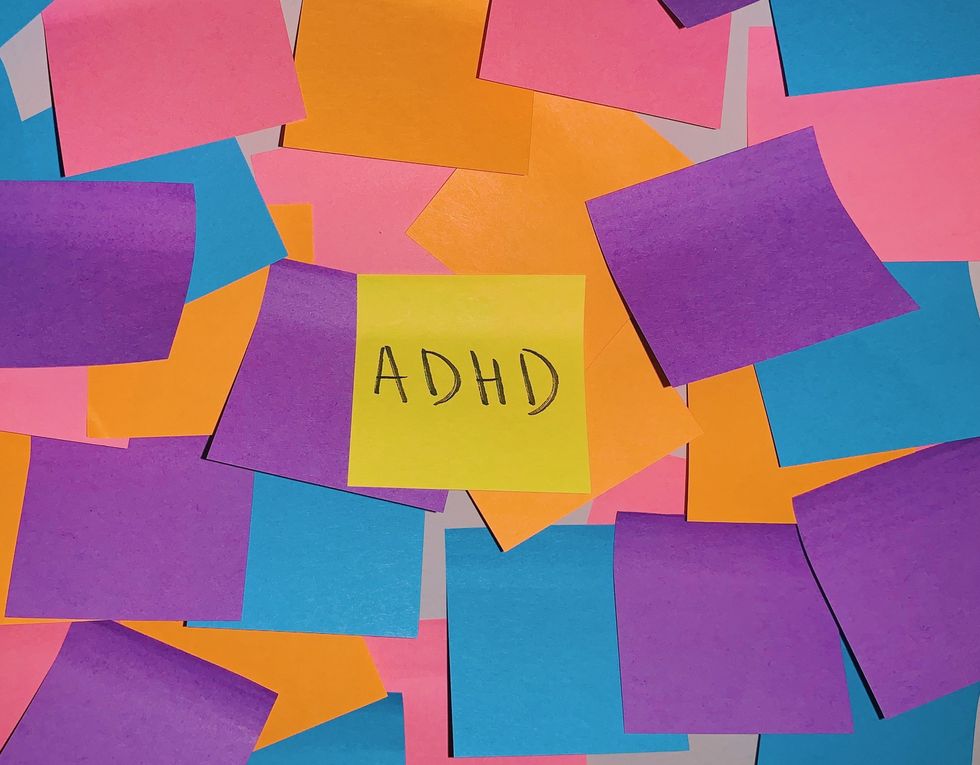Attention-Deficit/Hyperactivity Disorder, also known as ADHD, is a neurological disorder involving patterns of inattention, impulsivity and hyperactivity that affects the sufferer's functioning and developing. Diagnosed with the disorder at the age of 10, I have now joined the 4% of American adults who have been diagnosed with ADHD, and in my eight years of enduring and adjusting to the condition, I've learned a couple helpful coping mechanisms to help me deal with the struggles I face on a day-to-day basis. My personal solutions may not necessarily a panacea for everybody with ADHD; in fact, there are three subtypes of ADHD and the disorder presents differently in males and females, creating a wide range of symptoms and treatments. However, what I've discovered through my experiences has been incredibly helpful, and I hope that these coping mechanisms can be helpful to someone else, too.
Color is your friend
As someone who forgets things everywhere (just this morning I almost forgot my water bottle at the gym), bright colors help catch my eye and keep track of where items are. It's a lot harder to lose your phone in your bag when it's littered with colorful stickers or lose a giant, blue wallet. All of my reminders are written down in neon purple ink, which brings me to my next tip...
Write. Everything. Down.
Seriously. Remembering tasks, projects and appointments becomes easier when reminders are written down. Experts even say that writing things down makes recalling information easier. Sticky notes, agendas, planners and even just loose-leaf paper are all great tools to use for jotting down quick notes throughout the day. I personally use a legal pad that I carry around with me and create to-do lists on.
Compartmentalize
It's almost impossible to forget your phone, wallet or keys if they're all attached to one another! Investing in a cellphone wallet or a wristlet that you can both keep your phone in and connect your keys will help combat the supposed inevitability of accidentally leaving your valuables behind. Along the same lines of this advice, leaving your keys with groceries, gifts or other items you need to take with you before leaving is helpful as well. In fact, my grandfather leaves his keys in the fridge next to his half and half or leftovers from lunch so he'll remember to bring them back to his house at the end of the day.
Break it up
With limited focus at my disposal, it's very difficult to sit down and work for six straight hours. In fact, sometimes it's even a struggle just to get myself to focus at all. However, with the Pomodoro technique, completing mountains of work has become significantly easier. The Pomodoro technique works like this: focus for 25 minutes and take a five minute break. The 25 minute period of intense focus makes me put in substantial work and get stuff done, but by the time I'm feeling burnt out and distracted, it's time for a little break. This method, though normally used for studying, can be used for any task, such as filling out paperwork, writing essays or cleaning. Speaking of cleaning...
Learn to enjoy cleaning
Cleaning can, in fact, be made into an enjoyable activity. I used to be terribly messy and would let my disasters pile up, but from just adding in some music or a podcast, cleaning has become incredibly cathartic for me and I find myself doing a general pick up of my room at least once a week. Having a secondary item to focus on while cleaning rather than just the monotony of vacuuming or dusting makes the experience much more pleasant.
Make some space
Having space is something that is generally important for everyone, but especially for people with ADHD. Alone time has become vital to my life; it allows me to fully process the overwhelming world around me and feel a sense best described as closure. Despite the fact that many of us with ADHD feel the need to be constantly doing something, creating a safe space to sit and relax and do absolutely nothing is fantastic for our mental health and wellbeing. Studies show that downtime allows for the mind to be at peace, access emotions, break down our buildup of stress and ultimately, provide us with some much needed focus.
- Here's What Happened When I Got My ADHD Medication Re ... ›
- 10 Reasons I'm Thankful For My ADHD ›
- ADHD Is A Fake Disorder ›
- My Struggle With ADHD ›
- A Response To “You Don't Have ADHD, You're Just a Millennial” ›
- 32 Things A Person With ADHD Wants You To Know ›
- The Untold Reality Of My ADHD Condition ›
- ADHD and Anxiety Aren't Just "Excuses" ›
- Recognizing and managing ADHD in adults - Harvard Health ›
- Attention deficit hyperactivity disorder (ADHD): Coping with ADHD in ... ›
- How ADHD Adults Cope Before Treatment | Psychology Today ›
- 12 Best Tips for Coping with ADHD ›
- Parenting Tips for ADHD: Do's and Don'ts ›
- Tips for Managing Adult ADHD - HelpGuide.org ›
- Dealing with ADHD: 80 Coping Strategies ›








































